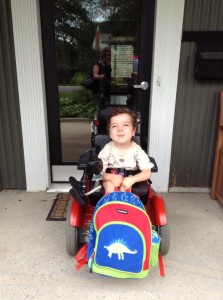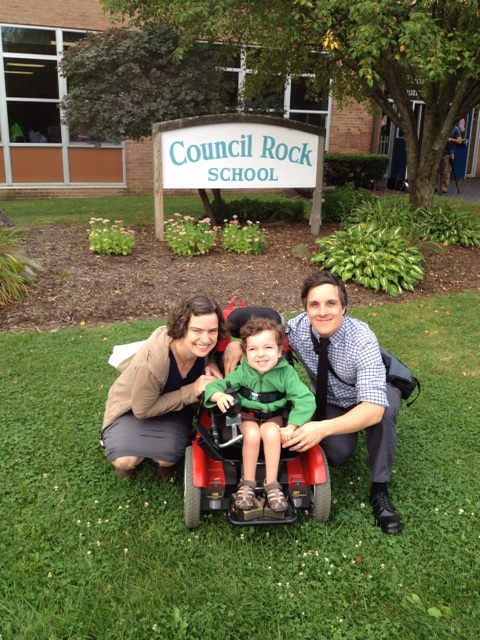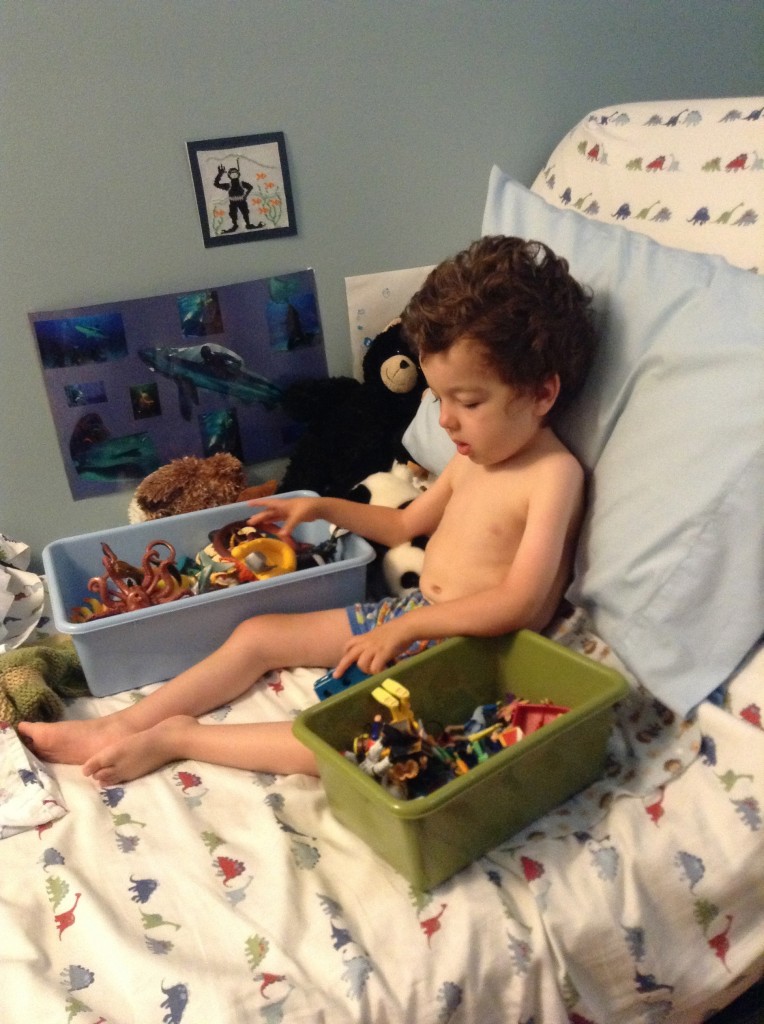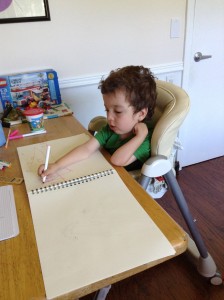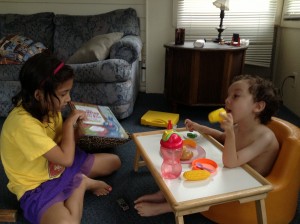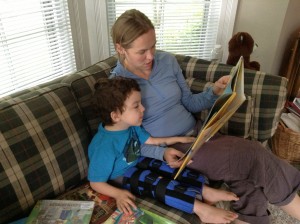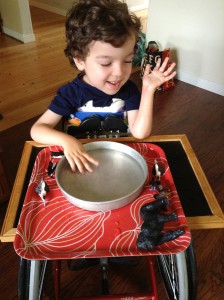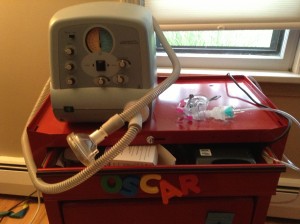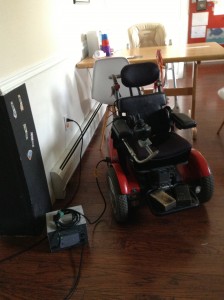Oscar started kindergarten almost three weeks ago. He LOVES it! The first day we asked him how it was, and he said, “It was AWESOME.” And he has continued that same response every day.
Oscar is in a typical kindergarten classroom with 18 other children, one teacher, and a one-on-one aide. And it just so happens that a well-liked teacher from his preschool followed him to kindergarten to be his one-on-one! He attends five mornings a week, for two-and-a-half hours each day. His school runs on a 6-day cycle (meaning he has his special classes—music, library, and gym—on days 2, 4, and 6, rather than Monday, Wednesday, Friday—that way when there is a Monday or Friday holiday, no one is missing out on their special classes). Oscar has his PT and OT services after school on three cycle days, as well, so as not to pull him out of the busy kindergarten day for services. He just gets a half hour or an hour (depending on the day) tacked on to his school day. In addition, his physical therapist attends gym class with him, and his occupational therapist pushes in to his classroom one cycle day during work time.
There was a lot of preparation leading up to the first day. We had eleven visits/meetings at the school, that I can recall, between January and August. Some of these are visits that any child entering kindergarten would make: 1. Parent informational meeting, 2. Registration (dropping off paperwork), 3. Kindergarten screening day, 4. Meet the teacher and visit the classroom. The other seven were more specific to a child falling into the realm of special education with an IEP (Individualized Education Plan), or just more specific to Oscar himself: 1. An initial meeting with the school psychologist, who is also the chair of the Committee on Preschool Special Education and helps many families with transition (this was to start talking about classroom layout, toiletting needs, busing needs, etc), 2. A meeting with the school psychologist, Oscar’s new PT and new OT to start to lay a plan for his services, 3. A tour of the building with Oscar to get him familiar and to assess the accessibility of the facilities, 4. The CSE (Committee on Special Education) meeting to go over his IEP and address any needs for the coming year, 5. A visit to the playground with the PT to assess the accessibility of the playground and allow Oscar to become more familiar with his new PT, 6. A visit to demo a new stander for school, and 7. A team meeting (his teacher, his one-on-one, his OT, his PT, and us) the week before school started to go over final details before school started.
And this does not include the three times one or more personnel from the primary school paid a visit to Oscar’s preschool to observe him there, or the time his new PT came to our house for a visit.
We moved to Brighton, suburb just beside the city of Rochester, three years ago. Real estate in the Rochester area is cheap compared to much of the country. Taxes, however, are some of the highest in the country. And Brighton’s taxes are among the highest in the greater Rochester area. So far, as they have ushered us through preschool (Oscar did not attend preschool within the district, but the district oversaw the services he received through preschool), and now through the transition into kindergarten, every single penny of those high taxes is worth it.
The amount of care that has been taken in preparation for Oscar starting kindergarten has been incredible. Each person involved in this transition has asked us questions, listened to our answers, and followed our recommendations, except when they have come up with even better solutions themselves. Brighton tends to be known for their excellence, especially when it comes to children with special needs, and children who are bright. It appears that Oscar might fall into both categories, and so I think we have chosen the right district.
We have heard of other families affected by SMA who have sent letters home to parents in their child’s class at the start of the school year, introducing their child and family, and explaining the wheel chair, and what language might be appropriate to use. We brought this idea to staff at his school. They listened and then they asked questions. They wondered if calling attention to the wheelchair was really necessary. They are so adept at dealing with kids with all different kinds of needs that teaching diversity and acceptance is ingrained in everything they do. Oscar is Oscar. He uses a wheelchair. He’s still simply Oscar. It’s really a miracle that they are able to look at him the same way we do. To see the kid first, and the disability as secondary. And to teach that same open-mindedness to all the children at the school.
Dinner conversation has taken on new meaning since Oscar has started kindergarten. Often, he will sweetly ask each of us, “How was your day?” Then he will ask, “Do you want to hear about my day?” Each night, as a family, we look forward to hearing about Oscar’s adventures from kindergarten at the dinner table. He will often get partway through, and then ask enthusiastically, “Do you want to hear some more about my day?”
We know we are pretty lucky as, so far, Oscar describes his day in great detail to us, breathlessly recounting how he enjoyed center time—each day small groups in his class rotate to four different tables to do different activities, which might include pattern blocks, the geo board, an art project, working on a book, and even snack time! He is also quite enthusiastic about his specials: music, library, and gym. He loves recess and has mentioned seeing some friends he knows from outside of school on the playground. He loves the smart board and the ABC phonics song. And he has said about his teacher, “Mrs. Flaherty is the best.” Last Friday Oscar came home, nearly bursting at the seems with pride and joy, saying, “We did writing workshop today!” No surprise, the son of two writers…
Oscar is also making new friends, quickly it seems. He often comes home with stories about the kids who are in his center group (who rotate to each of the four centers with him), about what they are eating for snack, or how he and another child were naughty because they kept whispering to each other when they were supposed to be concentrating on a particular project. It feels like a real step forward. Prior to now, activities and play with other kids in his peer group have been so physical, and fast-paced, that it seems he sometimes got left behind—by no one’s fault (in fact the staff at his preschool was excellent at making sure he was included), just the simple nature of early childhood play. Not yet five, Oscar is one of the youngest kids in his class, if not the youngest. Now that he is surrounded by a slightly older peer group, with a slightly more structured routine, there seems to be a system established that allows him better access to friendship. This is very exciting!
We are looking forward to more kindergarten adventures as the year unfolds!
